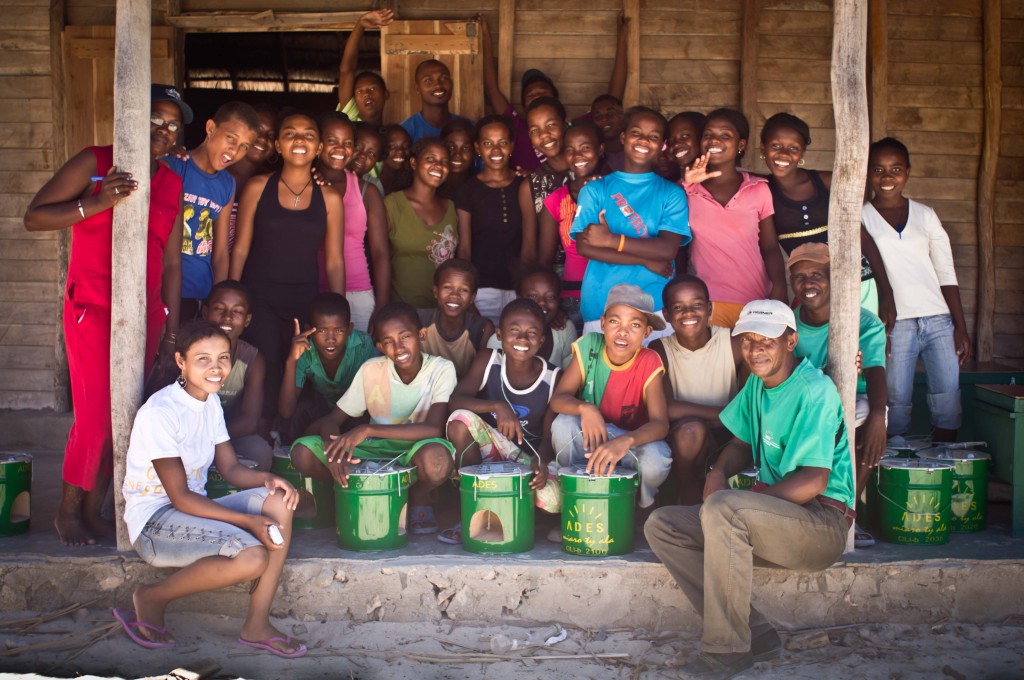by Merike Bruen, Education Programme Volunteer, Madagascar
As I approached the bright yellow school house that sunny Saturday morning, the shrieks of excited children were already audible. Smiling kids proudly sporting their crisp, new, white UNICEF t-shirts raced to the courtyard to greet their classmates. I tried to be discreet and watch the scene from a bit of a distance. There was no hope though, once spotted, laughing children from four to fourteen all came over to greet me. Bold children loudly greeted me with a confident “Salama!!” while the shyer ones hung back and smiled. It seemed like everyone wanted to shake my hand and say hello.
The bubbling enthusiasm was infectious, and I found myself actually feeling excited about going to school (even if it was on a Saturday). Children raced across the courtyard use the tippy taps (recycled bottles filled with water, tied up with string to function as tippable “taps” for hand washing) before the classes began, and I was explained by the education coordinator that hand washing is a major focus of these Saturday studies. From what I could tell, the lessons had worked! It was the first time I have ever witnessed children wash their hands with such zest. (I did contemplate using one of the taps myself to see what all the buzz was about… but I stuck with my hand sanitizer instead).
The two school house rooms were divided by age group. One room was for the six to ten year olds, the other for ten to fourteen year olds. As a volunteer assisting with Environment English curriculum development, I was here just to observe the classes, to better assess what types of English lessons would be appropriate for Saturday School, based on Blue Ventures’ environmental education themes and objectives.
Almost immediately I realised that fun creative activities, suitable for large groups involving little material, would be ideal. For the rest of the morning (four hours of teaching), I watched in amazement as the teachers effortlessly managed immense groups of students – significantly larger than any group I’ve ever taught! – while teaching everything from positive hygiene practices to the importance of tortoise conservation. There was a tea break that was met with much enthusiasm as the children had the chance to enjoy hot tea, as well as roasted peanuts that they prepare for themselves every Saturday School (SS) session, using solar ovens that they learned to operate a few SS sessions back. Following this break, there were three more lessons that were met with just as much interest and energy as the ones prior.
In the following weeks, I brainstormed lesson plan ideas and useful visual aids that could accompany them. Since I was only going to be in Andavadoaka for a month, I wanted to limit myself to creating materials that could feasibly be produced within that time frame. However, my ideas got ahead of me, and I realised that the amount of visual materials I would require and the amount of time I had left to make them were disproportionate. So many flashcards and displays, so few days left in Andava! I decided to spread the word among the BV Expedition volunteers and before I knew it, what began with one volunteer turned into a drawing party with over a dozen artists on hand, assisting me with creating various visual aids.
I don’t know what I would have done without their help! It was incredibly moving the way we all came together for the common cause of environmental education. As important, I think it also reminded us of how much fun it is to be a kid again, and simply immerse ourselves in drawing and colouring. On top of the sheer fun of artistic expression, it was motivating to realise that what we were doing would directly benefit those hundreds of children attending Saturday School – and perhaps even more children – here in the Velondriake community.
I’m hoping that the curriculum I’ve helped develop leaves a positive long lasting impression on the children here. I am very grateful for the unique and wonderful experiences I’ve had here and for working under the fantastic guidance of Christi Turner.



